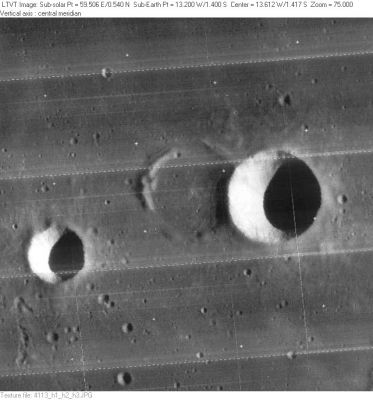Turner
Contents
Turner
|
Lat: 1.4°S, Long: 13.2°W, Diam: 11 km, Depth: 2.63 km, Rükl: 43 |
[2http://www.lpod.org/coppermine/albums/userpics/Turner_LO-IV-113H_LTVT.JPG00 
LO-IV-113H Turner is the large shadowed crater on the right. The ghostly ring to its west is unnamed. The 7-km diameter crater near the left margin is Turner F.
Images
LPOD Photo Gallery Lunar Orbiter Images Apollo Images
Turner was also photographed on several frames of Apollo 16's Revolution 37 (by the Fairchild mapping/metric camera aboard Apollo 16's SIM-bay). Frame AS16-M-1417 shows Turner to the left of the curved horizon's central part.
Research Danny Caes
Maps
(LAC zone 76B2) LAC map Geologic map LM map AIC map
Description
A typical bowl-shaped simple crater. Immediately adjacent is a ruin of nearly the same size, illustrating what Turner would look like if were filled with lava - a before and after scene! - tychocrater Jul 22, 2007
Description: Wikipedia
Additional Information
- Depth data from Kurt Fisher database
- Arthur, 1974: 2.63 km
- Westfall, 2000: 2.63 km
- Viscardy, 1985: 2.63 km
- From the shadows in LO-IV-113H, Turner is at least 2300 m deep and Turner F at least 1370 m deep (in both cases it appears the shadows may overshoot the deepest point). - Jim Mosher
- Turner and Turner F are thermal anomaly craters, implying youthful ages - Moore et al, 1980
- Included on the ALPO list of banded craters
- About halfway between Turner and Gambart there's a curious system of two arc shaped hillocks of which the southern parts join together at a small bowl shaped crater. See: http://bit.ly/2EXIpCM
Nomenclature
- Named for Herbert Hall Turner (1861-1930), a British astronomer and seismologist. Turner was a founding member of the Committee on lunar nomenclature formed by the International Association of Academies at Vienna in 1907 (serving as Secretary), and the first President of the corresponding IAU Commission charged with bringing the first internationally-agreed upon lunar nomenclature to completion.
- This crater was Catalog Number 2922 in Mary Blagg's Collated List (1913), in which it is noted that all three authorities used the name Lalande E.
- Upon Turner's retirement from the presidency of IAU Commission 17 in 1928 (IAU Transactions III, page 240), letters from Müller and Lamèch were reportedly read "proposing a new name on the lunar map" (presumably Turner), with the retiring President "deprecating this introduction."
- The catalog number was renamed Turner in Blagg and Müller's Named Lunar Formations (1935), where the name is attributed to Lamèch, although the proposed name does not appear to have ever been explicitly mentioned in the IAU Transactions.
- The name Lalande E does not seem to have been used in Named Lunar Formations, but it was later re-cycled to a 4-km crater in the System of Lunar Craters.
- Turner Lambda (hill east-northeast of Turner).
- Turner Upsilon (hill south-southeast of Turner) (for the hills Turner Lambda and Upsilon, see Chart 54 in the Times Atlas of the Moon).
- Turner Gamma and Turner Tau (according to page 185 in Tony Dethier's Maanmonografieen two hills south of Turner).
- Turner Mu (according to page 185 in Tony Dethier's Maanmonografieen a hill northeast of Turner, together with Turner Lambda).
- Turner F's southwest ray (a nickname from D.Caes for Turner F's southwest running high-albedo ray).
- Turner's ghost (a nickname from D.Caes for the officially unnamed ghost crater immediately west of Turner).
- Two arcs (a nickname from D.Caes for an odd formation northwest of Turner) (about halfway between Turner and Gambart on Chart 32).
Other Turners
- Perhaps interesting to know that there's also (or there was also?) a certain Mr. Ralph Turner who is (or was?) a scientific sculptor of small areas on the Moon's surface. A photograph of one of his creations (a bass-relief model of the central peak of Alphonsus) was printed on page 29 of the book Operatie Maan by the Dutch populariser Chriet Titulaer.- DannyCaes Dec 19, 2010, and the model itself (about 6 ft wide) is mounted on a wall at the Lunar and Planetary Lab in Tucson. Ralph also made a model of Schröter's Valley. I visited him often in his studio and dated his assistant. - tychocrater Dec 19, 2010
- About Ralph Turner, see Charles Wood's text in the page The Founding of LPL, 1960-1972. - DannyCaes Dec 22, 2010
- Also interesting: J. M. W. Turner (Joseph Mallord William Turner, 1775-1851, British romantic landscape painter, commonly known as "the painter of light").- DannyCaes Jun 17, 2014
Bibliography
Much more Turners in Mysterious Universe (William R. Corliss) :
- A certain Turner is mentioned in the article The Stationary Radiation of Meteors (W.F.Denning, Observatory, 1913), see pages 288-289 in Mysterious Universe, a handbook of astronomical anomalies (William R. Corliss, The Sourcebook Project, 1979).
- Another Turner (or perhaps the same?) is mentioned in the article Additional Notes on the Question of Living Bacteria in Stony Meteorites (Sharat K. Roy, Popular Astronomy, 1937), see page 326 in Mysterious Universe.